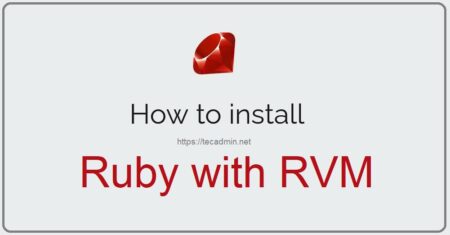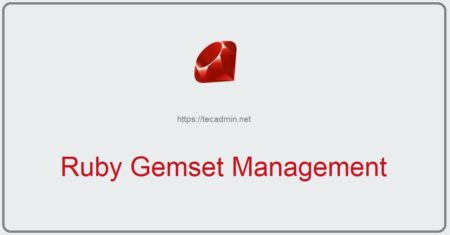Ruby 2.2.4 Released, This is an upgrade of Ruby 2.2 series. Ruby is a dynamic, object-oriented programming language.We are using RVM, which stands for Ruby Version Manager, which makes easier to install Ruby on Linux platform. RVM is also helpful for managing multiple version of Ruby without conflicting, and we can switch system to any version of Ruby using a single command.
This article will help you to How to
Step 1: Install Required Packages
Firstly we need to install all required packages for ruby installation on our system using following command.
# yuminstall gcc-c++ patch readline readline-devel zlib zlib-devel # yuminstall libyaml-devel libffi-devel openssl-devel make # yuminstall bzip2 autoconf automake libtool bison iconv-devel sqlite-devel
Step 2: Install RVM
Install latest stable version of RVM on your system using following command. This command will automatically download all required files and install on your system.
# curl -sSL https://rvm.io/mpapis.asc | gpg --import - # curl -Lget.rvm.io | bash -sstable
Now use below command to setup rvm environment.
# source /etc/profile.d/rvm.sh # rvm reload
Step 3: Verify Dependencies
Now use following To verify all dependencies are properly installed.
#rvm requirements run Checking requirements for centos. Requirements installation successful.
Step 4: Install Ruby 2.2
After completing setup of RVM environment, lets install Ruby language using following command.
# rvm install2.2.4
[Sample Output]
Searching for binary rubies, this might take some time.
No binary rubies available for: centos/7/x86_64/ruby-2.2.4.
Continuing with compilation. Please read 'rvm help mount' to get more information on binary rubies.
Checking requirements for centos.
Requirements installation successful.
Installing Ruby from source to: /usr/local/rvm/rubies/ruby-2.2.4, this may take a while depending on your cpu(s)...
ruby-2.2.4 - #downloading ruby-2.2.4, this may take a while depending on your connection...
% Total % Received % Xferd Average Speed Time Time Time Current
Dload Upload Total Spent Left Speed
100 12.7M 100 12.7M 0 0 33.5M 0 --:--:-- --:--:-- --:--:-- 33.6M
No checksum for downloaded archive, recording checksum in user configuration.
ruby-2.2.4 - #extracting ruby-2.2.4 to /usr/local/rvm/src/ruby-2.2.4....
ruby-2.2.4 - #configuring...................................................
ruby-2.2.4 - #post-configuration..
ruby-2.2.4 - #compiling.....................................................
ruby-2.2.4 - #installing............................
ruby-2.2.4 - #making binaries executable..
ruby-2.2.4 - #downloading rubygems-2.4.8
% Total % Received % Xferd Average Speed Time Time Time Current
Dload Upload Total Spent Left Speed
100 437k 100 437k 0 0 2367k 0 --:--:-- --:--:-- --:--:-- 2376k
No checksum for downloaded archive, recording checksum in user configuration.
ruby-2.2.4 - #extracting rubygems-2.4.8....
ruby-2.2.4 - #removing old rubygems.........
ruby-2.2.4 - #installing rubygems-2.4.8......................
ruby-2.2.4 - #gemset created /usr/local/rvm/gems/ruby-2.2.4@global
ruby-2.2.4 - #importing gemset /usr/local/rvm/gemsets/global.gems...............................................
ruby-2.2.4 - #generating global wrappers........
ruby-2.2.4 - #gemset created /usr/local/rvm/gems/ruby-2.2.4
ruby-2.2.4 - #importing gemsetfile /usr/local/rvm/gemsets/default.gems evaluated to empty gem list
ruby-2.2.4 - #generating default wrappers........
ruby-2.2.4 - #adjusting #shebangs for (gem irb erb ri rdoc testrb rake).
Install of ruby-2.2.4 - #complete
Ruby was built without documentation, to build it run: rvm docs generate-ri
Step 5: Setup Default Ruby Version
Use rvm command to setup default ruby version to be used by applications.
#rvm use 2.2.4 --default Using /usr/local/rvm/gems/ruby-2.2.4
Step 6: Check Current Ruby Version.
Using following command you can check the current ruby version is used.
#ruby --version ruby 2.2.4p230 (2015-12-16 revision 53155) [x86_64-linux]
Congratulation’s you have successfully install Ruby on your system. Read our next article to integrate Ruby with Apache web server with easy steps.
References:
1. http://rvm.io/rubies/installing



4 Comments
Thank u
Thanks for the post just what i needed.
This install did not work on RH 7.x
-bash-4.2$ rvm requirements run
Checking requirements for redhat.
Unable to locate SystemId file. Is this system registered?
Unable to locate SystemId file. Is this system registered?
Enabling optional repository
Then it ask for username and passwd
Thx… I fix the error by installing a development version of my libyaml.